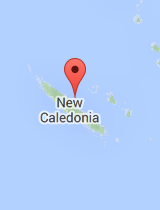Medical Summary
The health risk information presented here is summarized from Shoreland Travax®, a decision-support tool used by health care providers to perform a detailed health risk analysis based on specific locations, individual travel styles, and traveler risk behaviors. Travax provides practitioners current, independently researched malaria risk and prevention recommendations in a map-based format that goes beyond the annual WHO and US CDC statements included here. Not included here are current reports from Travax of disease outbreaks or environmental events that may pose elevated risks to travelers’ health and safety. The Providers section of this site offers a directory of health care providers who utilize Shoreland Travax for travel health counseling. Learn more about the detailed reports and maps available from these practitioners (includes links to samples).
General Information
New Caledonia, a territorial collectivity of France, is an industrialized nation in the top 25% of the world's economies. Located in the Pacific Ocean (east of Australia), the climate is classified as humid equatorial (long dry season).
Vaccinations
Yellow Fever
See also: Library article for Yellow Fever
Although yellow fever does not occur in New Caledonia, an official yellow fever vaccination certificate may be required depending on your itinerary.
- Requirement: A certificate proving yellow fever vaccination is required for travelers aged ≥ 1 year coming from countries with risk of YF transmission. This also applies to airport transit stops (no exit through immigration checkpoint) longer than 12 hours in risk countries. Note: In the event of an epidemic threat to the territory, a specific vaccination certificate may be required.
Other Vaccines
Depending on your itinerary, your personal risk factors, and the length of your visit, your health care provider may offer you vaccination against COVID-19, hepatitis A, hepatitis B, influenza, measles, mumps, rubella, rabies, or typhoid fever. Routine immunizations, such as those that prevent tetanus/diphtheria or "childhood" diseases, should be reviewed and updated as needed.
Malaria
See also: Library article for Malaria
The following is current information as reported by the World Health Organization (WHO) and the US Centers for Disease Control (CDC):
WHO—International Travel and Health (current online update, Country List)
No statement given.CDC—Health Information for International Travel (current online edition)
Areas with malaria: None.
Drug resistance: Not applicable.
Other Concerns
Travelers' Diarrhea
See also: Library article for Travelers' Diarrhea
Moderate risk exists throughout the country, with minimal risk in deluxe accommodations. Community sanitation and food safety measures may be inadequate. Some itineraries (e.g., remote destinations, austere accommodations) and activities (e.g., ecotourism, eating street or local-market food) further increase risk.
Travelers should observe food and beverage precautions, which reduce the likelihood of illness.
Travelers should carry loperamide for self-treatment of diarrhea and, if risk is moderate to high, an antibiotic to add if diarrhea is severe. Consult a knowledgeable health care provider regarding which antibiotic is appropriate for you and most effective for your destination.
Other Food-Borne Illnesses
Precautions to prevent seafood poisoning may be needed.
Insect- and Arthropod-Borne Diseases
Dengue may pose a risk. Personal protective measures are important.
Other Disease and Health Risks
Additional concerns include hepatitis C, leptospirosis, marine hazards, melioidosis.
Consular Advice
The material below includes information from the US Department of State (DOS), the UK Foreign, Commonwealth & Development Office (FCO), Global Affairs Canada (GAC), and Australia's Department of Foreign Affairs and Trade (DFAT), as well as from additional open-source material. Standard safety precautions that apply to all international travel can be found in the Library article Safety and Security.
Terrorism Risk
No intrinsic risk of attack by terrorist groups exists, but unforeseen attacks are possible.
Crime
Negligible risk of violent crime and moderate risk of petty crime exist throughout the country.
Theft of valuables from unattended accommodations is common.
Risk exists of robberies and/or assaults occurring after consuming intentionally drugged food or drink; tourists are frequently targeted.
Civil Unrest
Protests and demonstrations may infrequently occur and have the potential to turn violent without warning. Bystanders are at risk of harm from violence or from the response by authorities. Disruption to transportation, free movement, or the ability to carry out daily activities may occur.
Water Safety
All beaches in Nouméa (except Baie des Citrons, where a small designated area is open from 8:45 a.m. to 4 p.m.) are closed until December 31, 2023, following 3 shark attacks.
Rent water sports equipment from reputable operators. Scuba dive only with personnel certified by PADI or NAUI, and use equipment only from PADI- or NAUI-certified dive operators.
Transportation Safety
National incidence data on traffic-related injury or death are not available.
Natural Disasters
The cyclone season is from November through April. Floods, mudslides, and landslides may occur.
Consular Information
Selected Embassies or Consulates in New Caledonia, a Territorial Collectivity of France
- United States: The U.S. does not have an embassy or consulate in New Caledonia.
- Canada: Canada does not have an embassy or consulate in New Caledonia.
- United Kingdom: [+687] 282-153
- Australia: [+687]-272-414; www.noumea.consulate.gov.au
New Caledonia's Embassies or Consulates in Selected Countries
- In the U.S.: New Caledonia does not have an embassy or consulate in the U.S.
- In Canada: New Caledonia does not have an embassy or consulate in Canada.
- In the U.K.: New Caledonia does not have an embassy or consulate in the U.K.
- In Australia: New Caledonia does not have an embassy or consulate in Australia.
Visa/HIV Testing
HIV testing is not required to obtain a tourist, work, or residence visa.

